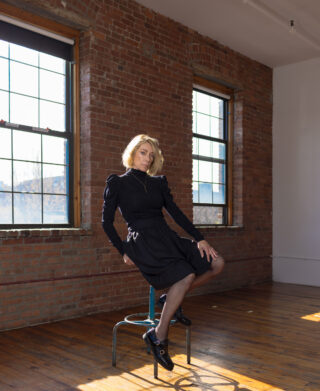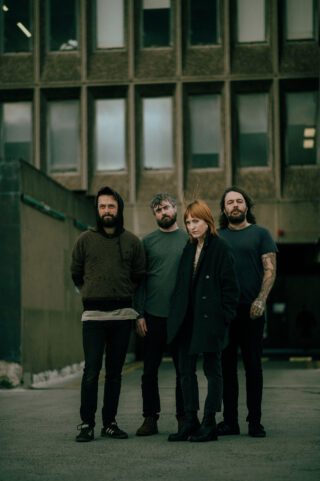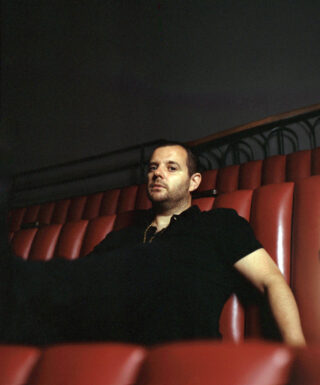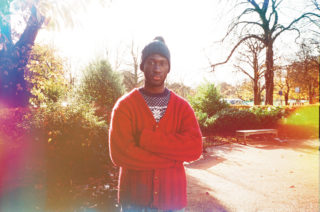
Through the chocolate box windows of Blackheath tea pavilion, I watch Kwesi Sey arrive on an immaculately kept Brompton bicycle, calmly collapse it, hover a second and nervously enter. It’s early morning and brilliant sunshine floods the circular hut in the middle of the park. I’ve a foldable bike myself, namely so I can spend more time sat on the train with it rather than peddling, but for Kwes it’s about the engineering that’s gone into the contraption, something that he will later marvel at between posing for photographs. And that, in many ways, sums up the 24-year old – a methodical man far more interested in inner workings and invention than speed and blatant razzamatazz.
Kwes grew up on the other side of the heath, down the road in Lewisham, south London, where he still lives today. He is, by his own admission, a very shy person, who rarely speaks above a whisper and spent the first three quarters of his life indoors listening to music, some of it his own. All other spare time was taken up by his love for drawing and painting. “I’m going to try to rekindle that for my artwork,” he enthusiastically nods over tea. “Recently I’ve been using photos and blurring them, but I think for my album and the forthcoming EP I’m going to get back into painting. Like, you’ve got your Jackson Pollocks, but I also love people like Friedensreich Hundertwasser, who I named a song after, and I’m kinda continuing that with the next EP – there’s a guy called Paul Klee who’s a German/Swiss painter; that’s going to be the opening track on the EP…that’s an exclusive, right there,” he smiles.
As he told Vice in 2011, he’s been actively interested in pop music from an implausibly young age, since he was four years old. He’d study Top of The Pops, tape the radio and play his noise-making toys like they were meant for composition. He’d receive a slapped wrist for sitting at the two-tier electronic organ in his family home. And then, on his seventh birthday, Kwes received a gift that rapidly accelerated his musical prowess – a keyboard from his grandmother.
“I can remember that moment,” he says. “It was an amazing moment because before that I was learning to play tunes on a vtech toy telephone, and it had a one-octave keyboard on the bottom of it and I was learning tunes on that and then my Nan got me this slightly bigger keyboard and I couldn’t get off it. On the vtech there was only a one-note polyphony, so I couldn’t play more than one note at a time, which was annoying. I think this other keyboard had two-note polyphony,” he laughs. “And then I learned ‘Green Sleeves’.”
Tying all of Kwes’ musical experiences together, figuratively and literally, were wires. Whether in the television that beamed The Spice Girls into his living room on a Thursday night, the radio he worshiped, the toys he’d carried a tune on or the keyboard his Nan had given him, Kwes – born in 1987 – was a definite child of the new digital age. Soon he’d be experimenting with overdubbing on basic tape recorders, and eventually the Internet would really spring into life, opening a world of digital experimentation, schooling and possibilities. Kwes had learned the medieval ‘Green Sleeves’, but he’d done so on the most modern of instruments.
At ten, he was then first exposed to the idea of becoming a producer by his aunt; a piece of career advice that he has since realised rather triumphantly, producing Elan Tamara, Sunless ’97 and, most notably, Dels’ 2011 debut album, ‘GOB’ – a record that was much more than your average UK grime album on account of its lawless use of electronics and the varied reference points of a music junky. “That record is a hip-hop record, a pop record and a rock record in some respects,” notes Kwes. “When I was making that music, because I’m a massive Soft Machine fan and Robert Wyatt fan, and a fan of a lot of 70s prog rock, I was trying to get that in the music and the only other person who picked up on that was the mastering engineer.”
More recently Kwes has finished producing Speech Debelle’s second album, ‘Freedom of Speech’ (due February 2012), and in doing so has given the Mercury Prize winner a gutsier, meaner sound. “It was amazing,” he says, “and really tiring, and a real labour of love. I actually did my first sessions with her around this time last year and then maybe from December through to May of this year I’ve been working on it, and there were periods when I’d just be working on it over and over. I’ve heard many stories of artists falling out about making albums, and now that I’ve done that I can see where they’re coming from – it gets really intense sometimes, with the disagreements and all that, but I’m really glad I got involved in it.”
And Kwes’ reworks list is plentiful also, featuring the likes of Hot Chip, Zero 7 and Damon Albarn’s Monkey Opera, but really we’re in Blackheath tea pavilion to discuss his solo career, which, until now, has gotten off to a couple of false starts. Or one and a half, at least.
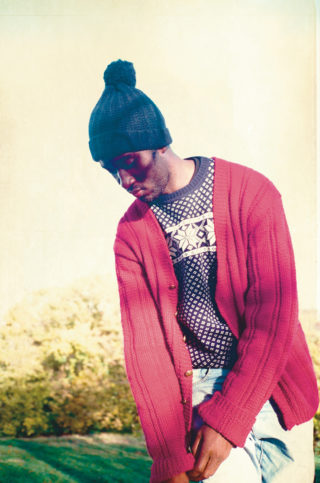
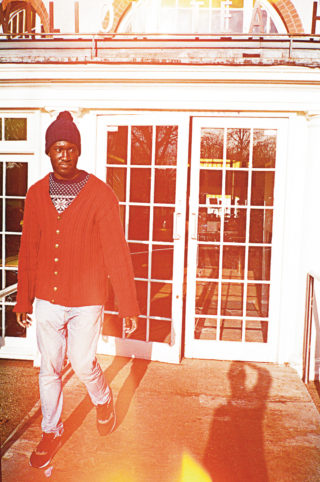
‘Hearts In Home’ – Kwes’s debut single – was released in January 2009. It featured an odd, static-ridden, ping-ponging sample that prevented it from being a straight-up electro pop song, while the lyrics were effortlessly half spoken, like those of Metronomy. If it had been released within the last twelve months it would have probably been muddled in with the chillwave lot, regardless of its clear experimental bent and distinct lack of Casio tones. Along with crackling b-side ‘Tissues’, it was an intriguing introduction to the then 21-year-old musician; clearly electronic but in no way dance music; detached and otherworldly but with too much intent to be dismissed as ‘ambient’. Then nothing. Kwes took another 18 months to follow ‘Hearts In Home’, with the purely instrumental ‘No Need To Run’ EP.
Incorporating trance synths and skitty dubstep drums on ‘In & Out The UK’, and euphoria organ chords on the EP’s title track, ‘No Need To Run’ partly quickened the pulse, but once again, despite the interest of many keen to see what Kwes would do next, it was followed by silence for another year and a half, until his signing to Warp Records was announced with free download ‘Get Up’ – a stark, self-help soul song from the lips of a sloshed motivational speaker.
When speaking about Warp – still Mecca for experimental electronic musicians – Kwes refers to them as “a childhood label”.
“It’s mad,” he says, “because I was making music around ten years ago, and a friend of mine back then was telling me to send stuff to Warp but I didn’t have the courage to, and here I am signed to them. Back then I was trying to get work experience at other labels but for some reason I didn’t get in touch with Warp. I don’t wanna do any naming and shaming but I didn’t get responses from any of those labels I applied for work experience at.”
As for the substantial gaps between Kwes’ releases, his production and remix commissions are easily fingered (“I continued writing but I got really busy with the production side of the things and doing re-works”), but they aren’t solely to blame.
“Up until now I’ve been very funny about putting out my own music,” he explains, “but it so happened that the A&R who was working at XL [the label that released ‘Hearts In Home’ and ‘No Need To Run’] knew that I’d been making my own music and really wanted to put some of my stuff out, and I was happy with the idea but at the same time I was kinda…” he trails off, looking down at the neat Brompton.
“I’m really enjoying working on my own material now,” he continues. “I’m in that frame of mind where I feel like I can really say something. But performing my own music is something I’m trying to get used to, because that’s not something that comes naturally to me. I mean, despite playing with many other bands, doing my own stuff is something I’m finding very difficult.”
Kwes is no stranger to the stage. For a man who spent his entire childhood indoors – and for one who remains just 24 years of age – he’s been in an alarming number of successful/nearly successful bands. In 2006 he “had a weird time” playing guitar for flash-in-the-eccentric-girl-pop-pan Ebony Bones – the overly wacky moniker of Family Affairs actress Ebony Thomas. Then there was a (very) brief stint with brat ravers Bono Must Die, playing keyboards. “I was meant to be a full time member but I only did a one-off gig with them because I wasn’t in London at the time – I was at Uni. That was so funny,” he laughs. “I remember that show was at ULU and there was a stage invasion of 13/14-year old kids trying to break the keyboards and stuff. I think I wanted to do it more, but it was weird because the day before I’d been in the studio playing on Jack Peñate’s album.” Kwes promptly joined his band too, and last year he toured with progressive house luminaries Leftfield for a summer, playing to 20,000 people a night. So standing in front of people and playing music isn’t a problem for the reserved Kwes, but standing in front of people and playing his music is.
“I totally enjoyed playing with all of those people,” he says. “They were great experiences. What worries me about playing my own songs is that they’re personal and close to me, but also that it’s me singing, in the centre, as the focal point. That’s really alien to me.”
It’s singing that Kwes is most terrified of, and yet his vocals are essential to humanising his computerised pop songs and giving them their sleepy charm amongst the loops of found sounds that are stacked high and beyond recognition. ‘No Need To Run’ was completely instrumental, although not on purpose, and while Kwes trembles at the thought of his songs featuring his lyrics and voice, he’s aware of just how fundamental his vocals are.
“That EP [‘No Need To Run’] is a very long story,” he says. “It’s essentially an unfinished body of work. It came out in that way, but it’s a long story. I eventually accepted it, but most of the new songs I’ve written lyrics for, and I’ve written three quarters of the album, so perhaps the other quarter will be instrumental. But even though I’m terrified of singing, I can’t get away from it. It’s an integral part and I have to do it. It’s almost a necessary evil.”

A week after we meet in Blackheath, almost three years after releasing his debut single, Kwes’ worst fear is upon him. In The Shacklewell Arms, east London, he steps on stage to play his first show as no one but himself. To mute the terror a little he’s not positioned himself centre-stage at all, but rather off to the left and guarded by a flank of keyboards and laptops. Elan Tamara is to help shoulder the burden, on keyboards and other electronics. At the back is live drummer Georgia. (The three of them also play together as Tamara’s band – yet another of Kwes’ musical concerns). Still, little can skew the fact that the venue, although small, is completely sold out, and with people anxious to finally see Kwes play his own songs.
I’d asked him how he felt about this impending doom last week. “I’m nervous, man,” he’d said. “Really nervous.” He looks it tonight, but only briefly. Soon, on account of the response he receives, he appears completely overwhelmed. “Bloody hell!” he repeatedly fathoms. “Erm, ok, I’m going to play another song now.” It’s as if he’s told himself to take it one track at a time; to only play more than the opening song if it seems like people are into it. The fact that people most definitely are comes as a constant surprise to him, up until the point where he thanks us all profusely, assures us that he “didn’t know what to expect from tonight” and says goodnight.
It’s an incredibly triumphant first show that consolidates Kwes’ sporadic output into one dense, joyful celebration of experimental pop music. Each song sounds rough and – as you’d expect – home-schooled, although not in a kitsch, knowing way, but rather more as if the composition of different sound elements is more important than how slick they’re pieced together in front of us. His love for prog rock is made all the more evident too, with most tracks hatching from a melee of delayed bass and blossoming into conventional pop songs of varying lengths before weird noise returns once again. ‘Broke’ is a skeletal soul ballad that you’d expect to hear from James Blake, keys clunking beneath Kwes’ brittle voice; ‘No Need To Run’ serves as a perfect, elongated, easily digestible, ravey closer.
He calls it ‘free pop’ (“pop music without boundaries”), and like his live show, his forthcoming EP, ‘Meantime’, nods to how anything goes in Kwes’ world, no doubt due to a lifetime of ODing on the top 40.
‘Meantime’s’ opener is ‘Klee’ – a track that emerges to sound like a pre-tortured Fuck Buttons before it makes way for the disco shuffle of ‘Bashful’, which will most likely stoke the inevitable (and sometimes justified) Metronomy comparisons that are bound to come Kwes’ way this year. ‘Honey’ is even more likely to get him on the radio, featuring a playful, creaky sample inspired by old friend and collaborator Micachu, and a simple, springtime vocal hook of “I’m stuck on you, honey/Come down here and join me”. And it turns out that Kwes is a much better singer than he thinks he is, especially on ‘LGOYH’, which lives hard-and-fast to the ‘free pop’ philosophy. It incorporates everything within its seven minutes, from falsetto RnB vocals to xylophone riffs, dirge guitars, indulgent bass, what sounds like loops of typewriter keys and deodorant cans spraying and swathes of ambient sound made up of god-knows-what. It’s definitely Kwes’ best release yet, and a precursor to his 2012 debut album.
“I don’t want to say expect the unexpected, because that’s just stupid,” Kwes had said when discussing his album. “I dunno, I could be completely wrong but I think I’ve created this really mysterious…” he trails off again. “I think it’s because I’m such a shy person and don’t like to big up myself or reveal too much about what I get up to. I see people on twitter telling everyone everything, and I forget sometimes that I’ve got twitter.
“I guess what to expect is… songs, noise… and, erm, pillaging, in some respects, and jokes… and one more thing – lots of found sound.”




